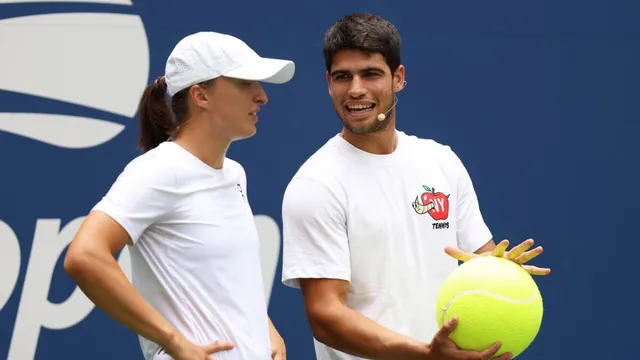
In a recent interview with Polish media outlet SportoweFakty.WP, World No. 1 Iga Świątek opened up about the personal challenges she faces as a top-tier tennis player, drawing an interesting comparison between herself and Spanish tennis star Carlos Alcaraz. While both athletes are among the brightest young talents on the ATP and WTA tours, Świątek used the comparison to highlight one aspect of her game—and her personality—that she believes “isn’t perfect.”
Świątek described herself as an introvert, someone who values peace, quiet, and stability, even amid the high-pressure environment of professional tennis. In contrast, she pointed to Alcaraz as more extroverted, someone who thrives in dynamic environments and seems to draw energy from social interaction, large entourages, and exuberant celebrations. According to Świątek, this difference isn’t just about personality—it directly impacts how each athlete manages the mental demands of the sport.
She admitted that one area where she feels she isn’t perfect is in how she handles the emotional side of the game. While her physical game and technical skills have earned her multiple Grand Slam titles, she acknowledged that maintaining emotional balance on and off the court is an ongoing process. “There are times I need solitude to feel centered again,” she explained. This self-awareness, however, is part of what makes Świątek such a thoughtful and grounded athlete.
The contrast with Alcaraz, who is often seen laughing, engaging with fans, and projecting an easygoing confidence, offers insight into the varied ways elite athletes manage pressure. While Alcaraz seems to flourish in the public eye, Świątek finds strength in stillness and calm. She said that after a tough match or a demanding tournament, she doesn’t seek out parties or large gatherings—instead, she prefers a quiet dinner with close family and friends, or time alone to decompress.
This self-reflection highlights a broader truth in sports: there is no one-size-fits-all approach to success. Some athletes thrive on adrenaline and external energy, while others require introspection and mental solitude. Świątek’s ability to recognize and honor her own needs is arguably one of the reasons she has been able to remain consistent at the top level of women’s tennis.
Her remarks also shed light on the importance of mental health in professional sports. As the conversation around athlete well-being continues to evolve, Świątek’s openness helps normalize the idea that vulnerability and imperfection are part of the journey—even for world champions.
In comparing herself to Alcaraz, Świątek wasn’t diminishing her own approach but rather emphasizing that greatness comes in many forms. Her quiet strength, combined with relentless discipline and mental resilience, proves that even if one’s game isn’t “perfect” in every dimension, authenticity and self-awareness can be just as powerful as raw talent.



